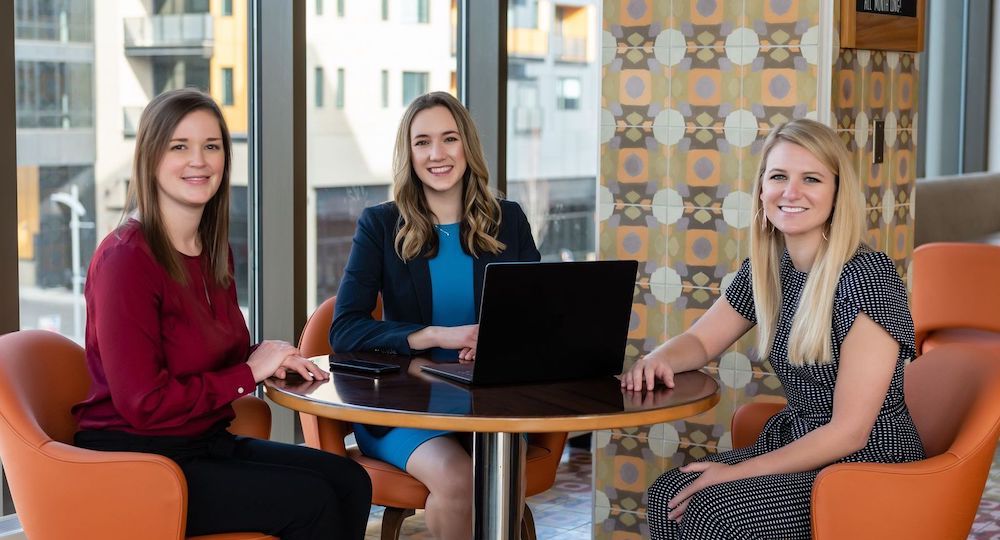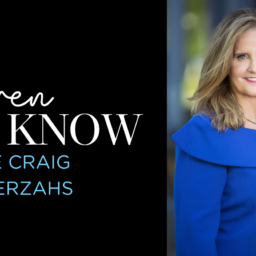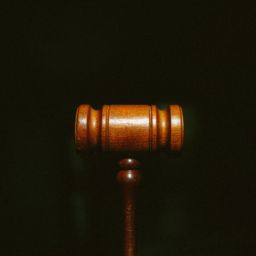
This story was created in partnership with Church Church Hittle + Antrim (CCHA)
Indy is a sports town, this much is clear. But did you know that it’s also home to one of the country’s most thriving sports law practices—at Church Church Hittle + Antrim?

We chatted with Kelleigh Irwin Fagan, a partner at CCHA Sports Law, about the work her (all-female!) group does every day, issues facing female athletes, and what we can expect to see in the future when it comes to college athletes and the use of their names, images, and likenesses.
What made this an interesting facet of law for you?
I was a student-athlete in college and had an impactful experience in college sports. I later went on to work with the NCAA enforcement staff, which ultimately led to my legal practice now. Being able to combine sports and law was always an interest for her.
Tell us a little bit about what is involved in CCHA’s sports practice and what it entails.
Our sports law practice focuses primarily in collegiate sports, including traditional legal work like contractual negotiations and review, but a larger part of our work is practicing “NCAA law.” We serve clients in various NCAA compliance matters and provide counsel to NCAA schools, conferences, student-athletes, coaches and other stakeholders in collegiate athletics. Our team members have extensive industry experience, having been student-athletes, coaches, on-campus administrators, conference officers, and NCAA national office staffers. There is a big NCAA rule book that governs what student-athletes, coaches, and schools can and cannot do in things like recruiting and Name, Image and Likeness (NIL), which is a hot topic at the moment.
Is your work typically focused on the athletes’ side of issues or on that of the colleges or the NCAA?
It’s really hard to untangle student-athletes from schools, but generally our clients are the universities themselves. Sometimes, families will hire us to help with student-specific cases and we’re always here to help student-athletes navigate the NCAA processes, which can be really opaque. But generally, we are working alongside the compliance offices on campuses to help advocate for the best possible experience and outcome for their student-athletes. Or we may work with a coach to make sure they are treated fairly in the NCAA investigation.

What are the most hot-button issues right now when it comes to sports and law?
Players getting compensated for their name, image and likeness is the hottest topic right now. Gender equity is another one where many coaches and administrators are using their voice to speak up for disparities among men’s and women’s sports.
If I had to sum it up in a word, it would be fairness. Fairness when it comes to how we take care of student-athletes’ minds and bodies, fairness in treating student-athletes like other students on campus and fairness when it comes to providing the same opportunities to women and men.
There is a lot of conversation around college athletics and an athlete’s rights to their own likeness and image and money made from that. How would you break down what’s happening in terms us regular, non-legally trained folks can understand?
Everyone has their own name (e.g. Sally Smith), image (e.g. picture of yourself), likeness (e.g. an emoji or a character in a game—something that looks like you or is distinctive to you). In most cases, if a sponsor or entity wanted to use your NIL, they would have to ask your permission and potentially pay you. And if the market demanded it, you could use your NIL to make money—sell a product or service. Right now though, colleges and the NCAA can use student-athletes’ NIL, but student-athletes themselves cannot use it to profit.
The NCAA model is based on the premise that the competitors are amateurs—that they play for the love of the game and their schools, maybe for an athletic scholarship, but not for profit. So there are a lot of rules in place about how a student-athlete can and cannot make money. They don’t get paychecks, they don’t get performance bonuses and they can’t make money off of endorsements or their athletics reputation.
We are in an era when coaches are getting paid millions of dollars, sometimes even after they get fired for doing a bad job. That contributes to why we’re seeing so many people question rules against these athletes making money from running a sports clinic or selling an autographed helmet. People don’t get why a cello player in the school symphony can charge for lessons but a soccer goalie can’t. Or why a dance major can make a ton of money from making TikToks but a gymnast who lives in the same dorm can’t post a #sponsored image on Instagram. It seems unfair, and people are unhappy with it. So we are starting to see this change in the NCAA’s approach to NIL and in state governments and even at the federal level.
RELATED: SPORTS AND THE ARTS: AN INDIANAPOLIS LOVE STORY
Where do you see that conversation and those policies moving in the future? Are we due to see a big change in college athletics anytime soon?
Yes, you’re going to see a lot of major events converge this summer. The Supreme Court is set to decide a big NCAA antitrust case sometime in June. A few of the state bills on name, image and likeness go into effect July 1. Congress may try to pass a federal name, image and likeness bill before their summer recess. The NCAA is expected to do something this summer as well. Rule changes are coming in football and basketball that will make it easier for kids to transfer schools. Ultimately though, for fans, I’m not sure it’ll feel all that different this fall.
What are some of the aspects of a sports law practice that would be unexpected to those of us on the outside?
There are only a handful of firms working in this space. We are proud to be the first and only all-female sports law group in the United States and have represented clients across the country, including Power 5 schools and other Division I schools.
Regarding the practice itself, kind of like how Ted Lasso is a show about soccer that’s not really about soccer, what we do as sports lawyers is often not about sports. It’s about fairness and opportunity and access and achieving goals. It’s about the people that play the game and not the game itself.
Are there issues specifically facing female athletes that we should be paying more attention to?
Women’s basketball players during the NCAA tournament turned to TikTok, Twitter and Instagram to showcase the differences between the amenities the men received versus what the women received. The women’s weight room issue resulted in national outcry to pay more attention to what the women are doing in sports because the interest is growing and they deserved the same treatment as men. We should be paying attention to females in sports and the viewership young females are getting. It is especially relevant in the new future of college sports related to NIL as studies are showing that female student-athletes could really benefit from using their NIL because they effectively use social media and have social media followings.
Many think they will be able to make a lot of money once profiting from NIL is permissible.
What has been the most surprising thing to you about this aspect of the law and sports?
The value of compliance behind the scenes is really incredible. There is much more to college basketball, football, volleyball, lacrosse, etc. than we all realize. For example, The undertaking of a prospect visiting campus is not simple and likely undervalued by the parties visiting campus. Coaches, administrators, graduate assistants, managers, parents, boosters, must be aware of the rules and what is permissible versus impermissible. One miscommunication or interpretation of a rule could be costly. We really admire everyone’s commitment to their respective sports and the daily work that goes into the student-athlete experience.
For more on CCHA Sports law, click here or follow @CCHACollegiate on Twitter. You can also check out Church Church Hittle + Antrim on LinkedIn and Facebook.
Photos courtesy of CCH+A Sports
Abby Gardner is Indy Maven’s executive editor and resident sports fan.
All of our content—including this article—is completely free. However, we’d love if you would please consider supporting our journalism with an Indy Maven membership.








